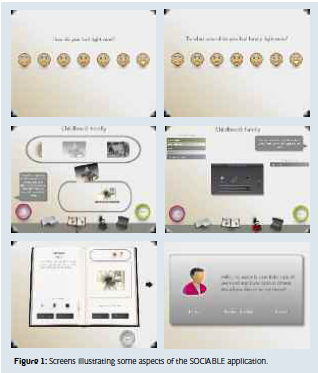By Mariano Alcañiz & Irene Zaragozá
Recent research results show that mental activity, as well as social interaction, is a key prerequisite for alleviating dementia. SOCIABLE is highly motivated by the fact that a combination of physical and mental activity, along with social engagement and a brain-healthy diet, is more effective than any of these factors alone. Hence, the SOCIABLE project will pilot a radically new ICT-based approach for integrated support of mental activity, as well as boosting of social interaction for individuals that have been diagnosed with mild dementia.
Methodology of the SOCIABLE Project
This new approach will build upon three tested technological pillars, which have proven been proven to be of therapeutic value, namely: (a) Novel perceptive mixed reality interfaces based on multi-touch surfaces, (b) A modular platform for cognitive training games development, which allows the flexible creation and customization of cognitive training games and (c) “Profiling” and social “matching” capabilities boosting social networking and interaction between elderly individuals.

SOCIABLE will combine the ever-important factors of human care and support with innovative ICT-enabled services (notably, services available over surface computing infrastructures) and independent living technologies. Specifically, SOCIABLE will integrate human support and care services offered by care centers, health professionals and specialized medical experts, with state-of-the-art ICT infrastructure and independent living technologies enabling elderly users to:
• Access a motivating recreational online (and offline) environment based on mixed reality interface technologies and play-related-therapeutic tools with an aim to prevent and alleviate the evolution of dementia through pleasant cognitive training-gaming activities for elderly people. This environment will include interaction ranging from individualized cognitive training, team/ group play, to a network of social activation activities involving multiple elderly users that reside in geographically diverse locations.
• Provide an automated tool for managing elderly patients’ related data and collecting measurements that support the assessment of cognitive status (improvement or deterioration) of people with mild dementia by experts. This involves the provision of information about the elderly person’s mood, cognitive/ functional/affective status and mental performance, as well as contextrelated information. Such information will be collected, maintained and presented in a systematic way to support health professionals and medical experts in care centers in interpreting the cognitive, functional and affective state of elderly individuals with mild dementia and help in defining appropriate training programs and other therapeutic measures.
• Activate and/or increase the quality and quantity of elderly people’s social interactions with other members of the ageing society, as well as with relatives and family. This will be achieved by combining human knowledge residing with caretakers about elderly patients’ profiles and preferences with an innovative ICT-based social “matching” service offered through the SOCIABLE platform that will instigate social interactions between elderly individuals and/or inter-generational interactions to the benefit of all elderly parties.
• Participate in community building activities that are instigated by and build on the results of the “matching” service. The SOCIABLE platform will support elderly-specific networking, socialization and community-building activities that will enable building and populating groups of elderly individuals that share similar problems and/or can benefit from mutual social interaction.
SOCIABLE will be piloted with the participation of a minimum of 350 senior citizens in seven different pilot sites (TRONDHEIM Kommune, Hygeia, Morgagni Pierantoni Hospital, Municipality of Forlì, Social Policy Centre of the Municipality of Kifissia, Santa Lucia Foundation and PREVI S.L) from four European countries (Greece, Italy, Norway, and Spain).
Conclusion
Overall, SOCIABLE will integrate, deploy and operate an innovative ICT-enabled online service for assessing and accordingly reinforcing the mental state of the elderly through pleasant gaming activities for cognitive training, while at the same time boosting their social networking and activating their day-to-day interpersonal interactions. SOCIABLE is envisaged as a service with a high potential for societal impact that could add significant value to current services offered for care services providers.
Mariano Alcañiz, Ph.D. Irene Zaragozá, Ph.D. Universidad Politécnica de Valencia Spain malcaniz@labhuman.i3bh.es www.labhuman.es
About Brenda Wiederhold
President of Virtual Reality Medical Institute (VRMI) in Brussels, Belgium.
Executive VP Virtual Reality Medical Center (VRMC), based in San Diego and Los Angeles, California.
CEO of Interactive Media Institute a 501c3 non-profit
Clinical Instructor in Department of Psychiatry at UCSD
Founder of CyberPsychology, CyberTherapy, & Social Networking Conference
Visiting Professor at Catholic University Milan.









